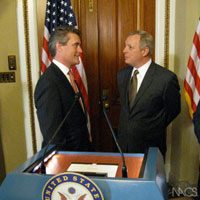 |
|
Sen. Durbin and NACS President and CEO Hank Armour discuss swipe fee reform and how it will benefit retailers and consumers. |
ALEXANDRIA, VA - Siding with retailers and consumers, U.S. House of Representatives and Senate negotiators have reached an agreement to include swipe fee reform provisions in the final financial services reform bill that will now go to Congress for a final vote. The provisions, known as the Durbin Amendment after the author, Senator Richard Durbin (D-IL), will bring critical financial relief to retailers and consumers while promoting greater competition within the credit card industry.
Earlier this week, Sen. Durbin announced that an agreement had been reached with key conferees regarding minor, clarifying changes to his amendment.
"This historic reform would not have been possible without the tremendous effort of our members who called on their senators and representatives and asked them to support this common-sense, consumer-friendly amendment," said NACS CEO and President Hank Armour. "These calls, along with the millions of consumer signatures convenience retailers collected and delivered to Congress urging credit and debit card fee reform, clearly shows that members of Congress are listening to their constituents."
Credit and debit card swipe fees ?" called "interchange fees" by the big banks that set these rates ?" are a percentage of each transaction that Visa and MasterCard and their member banks collect from retailers every time a credit or debit card is used.
The Durbin Amendment would direct the Federal Reserve to issue rules to ensure that debit card swipe fees are reasonable and proportional to the processing costs incurred. Visa and MasterCard currently charge debit swipe fees of around 1 percent to 2 percent of the transaction amount ?" among the highest rates in the industrialized world. A number of independent research reports have confirmed what retailers have long argued: Swipe fees are considerably more than the actual cost of processing transactions and provide no commensurate benefits to retailers or consumers.
The Durbin Amendment also includes a provision directing the Federal Reserve to issue rules preventing card networks from requiring that their debit cards can only be used on one debit card network ?" thereby ensuring that retailers will have the choice of at least two networks upon which to run debit transactions. In addition, the amendment would allow merchants to choose to decline credit cards for small dollar purchases because swipe fees often exceed profits on such sales. In addition, the amendment clarifies that retailers can offer discounts to consumers who choose to pay with cash, check or debit card.
In 2008 alone, Americans paid more than $48 billion in swipe fees. These fees are non-negotiable and set in secret by the credit card companies and their member banks, and increase the cost of goods and services purchased by consumers.
The decision to advance swipe fee reform came despite intense lobbying pressure from the financial community, which sought to discredit the amendment by inaccurately portraying it as damaging to small, community banks. The legislation, however, provides exemptions for small banks and credit unions. Banks with less than $10 billion in assets would not be affected by the legislation. Included in this exemption would be 99 percent of banks (all but 86), 99 percent of credit unions (all but 3) and 97 percent of thrifts (all but 11).
The campaign to reform the swipe fee system is not yet complete. Both the House and Senate must now approve the underlying bill, which enacts sweeping reforms of the financial services industry, before it's presented to President Obama for enactment. The lobbying pressure brought on Congress by the banking industry in the past few weeks in an effort strip the Durbin Amendment from the bill likely will now switch to an effort to defeat the bill as a whole. Indeed, the credit union industry is citing inclusion of the Durbin Amendment as rationale for its opposition. The White House and congressional leaders expect the retail industry to step up its support for the underlying bill to counter the credit union opposition.
Swipe fees have been the convenience and petroleum retailing industry??s top pain point and second largest expense item ?" behind only labor costs ?" for a number of years. As a percentage of overall sales, card fees increased in 2009, from 1.35 to 1.45 percent of total industry sales dollars, factoring in all forms of payment, including cash and check. Total credit card fees ($7.4 billion) also surpassed overall convenience store industry pretax profits ($4.8 billion) for the fourth straight year in 2009.
Last month, NACS delivered to Congress 2 million consumer signatures that were collected at convenience stores across the country, making it one of the largest collections of consumer signatures ever for a public-policy issue. Combined with the 1.7 million signatures that 7-Eleven franchisees collected and delivered to Congress last September, and the 1.7 million signatures Speedway SuperAmerica delivered in June 2010, 5.4 million consumers have weighed in on this issue over the past year.
"This fight is not over," said Armour. "We support the negotiated package and we must keep the pressure on to continue to fight for swipe fee reform and to get this legislation passed into law. NACS will continue to develop communications platforms that allow members to tell their elected leaders that we must eliminate the stranglehold that the big banks have on our businesses."